- Home
- Amanda Flower
Andi Unexpected Page 3
Andi Unexpected Read online
Page 3
Mr. Rochester, who’d been lounging beside me on a pile of old newspapers, meowed as if offended by my skinned-cat comment.
“Sorry, Mr. Rochester. No one would ever think of doing that to you.” I scratched behind his left ear.
Colin started moving boxes from a spot close to the window. “Amelie said they went to Guatemala a lot.”
I opened a box that was full to bursting with dusty artificial flowers, and I sneezed. “Yeah, they did. They were working with some other scientists down there, looking for endangered plants.”
After a bout of coughs and sneezes, Colin said, “I’m sorry about your parents.”
“Thanks.”
I rearranged a group of boxes so I could sit closer to the wall and lean against it while I sorted through the flowers. If I could somehow remove the years of dust from these silk petals and leaves, I thought, they might make good sellers at the garage sale. After we moved the boxes, I noticed the lower half of the wall was wallpapered from the floor up to my hip. Red and blue sailboats rocked on a gentle sea. The once-white billows of the ships were now yellowed like pages of really old books.
I stared at the wallpaper, thinking about my father as a little boy choosing that particular pattern because boats are symbols of adventure, of moving, of being somewhere else. My father always wanted to be somewhere else. Even after Bethany and I were born, he and my mother never stayed home much. Too many endangered plants in the forests of the world needed to be saved. The forests were too remote for us to join our globetrotting parents. During those times, just like we’d done during the last few weeks since the funeral, we’d stayed with the Cragmeyers.
A bright flash of lightning bounced off a piece of metal on the far wall. But when I looked more closely, the glint of metal disappeared. I crawled on my hands and knees to the spot.
“What is it?” Colin asked.
“I thought I saw something.” I pointed at the area where I’d seen the reflection.
“A ghost?” Colin asked. His eyes were the size of ping-pong balls.
“No, not a ghost. A piece of metal.”
“What’s so interesting about that?”
“I only saw it when the lightning flashed.” I tapped the wall. “It was right around here.”
Colin wove his way through the maze of boxes and squatted down beside me, forcing me to scoot over until my hip thwacked into the corner of an old maple dresser. Colin ran his hand up and down over the wallpaper. Abruptly, his palm froze while his fingers continued to tickle a particular spot in the wallpaper. “There’s something here.”
“Move your hand,” I said.
He did, and I put my own palm in its place. “What is it?” I asked.
“It felt like a hinge.”
“Like a door hinge?”
“Yeah.”
We looked at each other.
Colin asked, “Do you think we should open it?”
I slid my fingernail under the edge of the old paper. With a good grip, I peeled away a wide strip. Colin joined in. Piece by piece, the red and blue sailboats fell to the floor in shreds. The old glue, which had held the wallpaper onto the wall for all those years, posed no match for us. Sections of wallpaper came off in larger and larger pieces, leaving whole sailboats intact.
Finally, the scraps of discarded wallpaper revealed an outline of a small door in the wall. It looked nearly two feet high with no doorknob. The hinges made only the slightest bump on the wall, about the length of my thumb. Someone had drilled a small hole where a tiny doorknob should have been. I fit my pinkie finger into it. “How do we get in?” I asked.
Colin stood up and pieces of wallpaper floated to the floor. “There has to be something up here we could use. A screwdriver or a hammer, maybe?” He began opening boxes, and I joined in. Dust flew through the air as we rifled past generations of clutter. Colin sneezed but paused only a moment to wipe his nose on his dust-covered sleeve before continuing to look for the right tool.
“What about this?” I asked. I held up a silver letter opener with a tiger engraved on the handle.
“That should work.”
We knelt outside the door again. I slid the letter opener between the wall and the door. Colin spat on the hinges, and a few specks of his saliva hit my face.
“What are you doing?” I asked, wiping his spit from my eye.
“These hinges are old. I’m trying to lubricate them so the door opens easier. I saw it in a movie once.”
“Oh, good idea. Kinda gross, but still a good idea.”
He spat a couple more times, and I bent the letter opener against the wall, pressing down hard.
Snap! The tip of the letter opener broke off and clattered to the floor on the other side of the door. Luckily, the pressure from the blade cracked the door just enough so I could get my fingers around the edge. Colin did the same. “On the count of three,” I said.
We counted together. “One … two … three!” And then we pulled with all our might. Colin huffed with exertion beside me, and his face turned beet red.
The old hinges finally relented, and Colin and I toppled to the floor. I landed on his stomach—hard. A cloud of blue-black dust flew out of the open door like confetti. We both scrambled to our feet, waving the dust from our faces, coughing and gagging as we inhaled the musty scent of the long-forgotten crawlspace.
“Do you see anything?”
“Nothing.” Colin sneezed as the last bit of dust settled onto the floor.
I reached my hand into the black hole. My hand ran into something hard and square. “I think it’s a trunk! Help me pull it out.”
Colin squeezed beside me, and together we pulled out the trunk. It was about twice the size of a shoebox, and it looked as if it were meant to hold a doll’s clothes. Blue cracked leather covered the lid and peeled away from the trunk’s brass edges. I ran my hand over the uneven top. Colin scooted up beside me and peered closer at the old lock. He wiped the grime away with his T-shirt.
“Look,” he said.
I turned my gaze to where he was pointing and saw one word engraved on the trunk’s brass nameplate: ANDORA.
CASE FILE NO. 4
“I hope you guys like Kool-Aid,” Amelie announced, her head peeking through the open hatch. “What happened in here?” She climbed the rest of the way into the attic and put the drink bottles on top of an old dresser. “What on earth?”
Colin’s face turned an astonishing shade of red.
I jumped up. “I can explain.” I waded through the clutter toward my aunt and grabbed her hand. “Look what we found!” I led her back over to the corner. “There was a door hidden behind the wallpaper. And look! There was a trunk inside.”
Amelie grinned. “What’s in the trunk?”
“We don’t know yet,” Colin said, his color fading back to normal. “We haven’t opened it.”
Amelie squatted down and looked at the lock and the name etched in brass. “Andora,” she whispered. She stared at me in amazement, and I shrugged. “Colin, there’s a black crowbar hanging on the far wall of the garage that should do the job. Will you go get it, please?”
After Colin clattered down the ladder, Amelie said, “Well, we know one thing.”
“What?” I asked. I stared at the trunk trying to guess what was inside. Gold? Rubies? Diamonds? Valuable old baseball cards? Or just old clothes?
“Whatever is in that box is yours,” Amelie said.
“But …”
Amelie ran her hand over the trunk and grinned at me, “Hey, your name’s on it.”
I grinned back. “You’re right. It is.”
A moment later Colin’s head appeared through the hatch. Out of breath, he handed the crowbar to Amelie, who then handed it to me. “You do the honors, Andi.”
I placed the flat tip between the lock and the trunk lid and pressed down with all of my weight. The lock was stubborn and held for a few seconds until—crack!—it swung from its hinge and crashed to the floor.
We squatt
ed in front of the tiny trunk again. Using the crowbar to pry it open, I lifted the lid. A thin layer of tissue paper covered the contents. I gently picked up the paper and set it on another box nearby. The tissue crackled like dry leaves. Beneath the paper was a doll—a lovely, fragile china doll like those I’d seen in old Shirley Temple movies. The doll’s face was snow white with bright red lips. Her cheeks were perfectly round pink circles just below her large blue eyes. She wore a faded dress the color of summer cornflowers. I picked up the doll and handed it to Amelie.
“She’s beautiful,” Amelie said.
Colin wasn’t impressed with the doll and peered past it into the trunk. “What else is in there?” I think he hoped the little blue trunk contained a hoard of gold coins or rubies. Maybe I hoped the same.
The doll had been lying on some folded pieces of fabric. I unfolded each one and found two dresses—for a toddler maybe—and a white dress for an infant. One of the little girl’s dresses was pink. The other was pale yellow. Both were covered in ruffles. Amelie said the infant’s dress looked like a baptismal gown. Yellowed like the sailboats’ paper sails, the gown had a matching bonnet covered with tiny pearls.
At the very bottom of the trunk, we found three wooden blocks labeled A, B, and C with circus clowns and animals painted on the other sides. A clown put his head into a lion’s mouth; an elephant balanced on his hind legs on top of a beach ball; and six tiny clowns stuffed themselves into an even tinier car.
“What is all this?” I asked after we’d sorted through each piece. “How old do you think this stuff is?”
Amelie looked at the dresses and wooden blocks. “Probably mid-twentieth century, I would guess. Maybe around World War Two, possibly earlier.”
That got Colin’s attention. “Cool!”
It must have been the war part.
Amelie held the baptismal bonnet in her hand and gave it to me before standing up. “Looks like you have a mystery on your hands.”
At dinnertime, I asked Amelie again, “Are you sure you don’t know who Andora is?”
She popped a tater tot into her mouth and said, “When your dad told me he named you Andora, it was the first time I’d heard that name. It’s pretty unusual. I think I would’ve recognized it if I’d heard it before.”
“But don’t you think it’s weird that there’s a trunk in the attic with my name on it?”
Bethany pulverized her tater tots, smashing them into barely recognizable potato shreds. “Andi, you’ve been talking about it all day. What does it matter? If that stuff is really that old, then Andora is probably dead by now.”
I dropped my eyes to the boxed macaroni and cheese on my plate.
“That’s not necessarily true, Bethany. The person would be very old, in her eighties or nineties, but she could still be alive,” Amelie said.
I let out a breath. “Maybe you can help Colin and me tomorrow. I bet you’ll find stuff to use for your art projects.”
Bethany hopped off her stool. “I’m going upstairs to send my one text message for the day.”
“Okay,” Amelie said.
Whenever Bethany used that snippy tone with our parents, they grounded her on the spot. But life with Amelie was different, and maybe it was just what Bethany needed.
That night, I crept out of my bedroom and climbed the ladder into the attic. With a weak flashlight beam to guide me, I picked my way through the decades of castoff, forgotten keepsakes until I was back by the hidden door and the little blue trunk. I opened it again and examined each piece slowly. No answers jumped out at me, but in the dim glow of my flashlight, the trunk seemed so much more mysterious. I had to find out where it came from.
I held the wooden block with the elephant painted on it. I turned it over and over again in my hand until the images blurred. Tomorrow, I would find out who this other Andora was and why her life was hidden away in a little blue trunk.
CASE FILE NO. 5
The next morning, I stepped onto the porch a little after seven. No one else was up yet. Just like Dad used to do, I always wake up with the sun. He told me dawn was the best time of the day in Guatemala City, when the city shook itself awake. He promised he would take me there someday.
“You’re up early!” A voice interrupted my thoughts.
I spun to the left and saw Bergita with a mug in her hand. She was pitching back and forth on one of the cane rocking chairs on her front porch. Jackson snoozed on his pillow by the front door.
I skipped down the porch steps and trotted across the lawn. I paused at the foot of Bergita’s porch steps.
“This is certainly a pleasant surprise. I like to see young people up bright and early, ready to tackle the new day. Have a seat.” She motioned to the opposite rocker. On the small table between us, a perspiring teapot and a second mug waited as if they’d been expecting me. Also sitting on the table was a small plate holding two lumpy pastries I didn’t recognize.
Before sitting down, I patted Jackson on the head. The snub-nosed dog opened one brown eye, closed it, and made a happy snuffle sound.
Bergita set down her Daffy Duck mug and poured some tea into a faded mug with Bugs Bunny wagging a carrot on it.
She held the plate of pastries out toward me, and I took one, realizing for the first time how hungry I was. The night before, I’d barely eaten a thing because I’d been so excited about the mysterious Andora.
“What are these?” I asked, taking a small bite. It tasted both salty and sweet, and it had the consistency of an extra thick biscuit.
Crumbs fell onto my lap, and Jackson was up in a flash, sitting beside me with an I’m-starving-to-death look on his face. I brushed the crumbs off my T-shirt and shorts. He licked them off the floorboards.
“These,” Bergita held up her own pastry, “are called scones. They are an English pastry, and I just love them. I’ve eaten one every day for the last forty years, so they must be good for something.”
I took a bigger bite. When Bergita wasn’t looking, I broke off a small piece and slipped it to Jackson. He ate it and snuffled my palm with his nose. Now friends for life, the dog lay across my feet and went to sleep. He was surprisingly heavy.
Bergita licked her index finger to pick up the crumbs off her plate. “The perfect start to any day,” she declared. “Colin enjoyed himself yesterday.”
I stiffened, wondering if Colin had told his grandmother about our discovery. It was my story to tell. After all, my name was on the trunk. “I’m glad,” I said, before sipping my tea. I held the mug in both hands—just like Bergita. One hand grasped the handle; the other cupped the bottom rim. “What did Colin say?”
She grinned and resumed rocking back and forth, “Not much. Just that he helped you clean up the attic. Colin’s a funny kid like that. Perhaps he enjoyed the company more than the activity.” She winked at me.
A blush much hotter than the tea crept up my cheeks and into my pink hairline. I gritted my teeth.
I stumbled over the use of her first name, but somehow “Mrs. Carter” didn’t seem right. “Bergita?”
“Yes?” Bergita rocked gently in her chair. She sipped her tea while looking out over her lawn and flower gardens.
I gnawed the inside of my cheek, wondering if I should ask the question that nagged me. But my mother had said the most important characteristic of a scientist was not being afraid to ask uncomfortable questions. I figured if I wanted to be a scientist like my parents someday, I’d better get used to asking the tough questions now. “Did you know someone else named Andora?”
She didn’t seem surprised by the question. She rocked and sipped, and rocked and sipped. I shifted in my chair, waiting, holding back the dozens of other questions that were now bouncing around inside my head. A scientist must also be patient and wait for the results, I told myself. Scone and impatience gurgled together in my belly. I sipped the tea carefully, hoping to settle my stomach.
Bergita placed a hand on her chin. “I have heard your name before. Long, long ago when I was
just a child.” She smacked her lips in thought. “I was seven years old during the summer of 1946, and I was excited about starting the second grade because I’d have my own Aunt Maribeth for my teacher. One afternoon, I attended a church picnic and ran around with the boys, as usual.” She wrinkled her nose. “I was a real Dickens back then.”
“Dickens?”
She smiled. “A trouble-making child similar to the street urchins in Charles Dickens’ novels. The boys and I tried to snatch extra cookies from the picnic table. I knew my mother didn’t want me to have any more.
“Anyway, two women were standing at the table: Mrs. Frieda Baptist and Mrs. Louanne Mayes. Both of them are gone now, of course, but I overheard their conversation. Mrs. Baptist said, ‘Poor man. Nothing seems to hold him together.’ And then Mrs. Mayes said, ‘He still has the boy.’
“I wondered who they were talking about, and I snuck closer because I knew they were talking about someone at the picnic. I loved overhearing all of the scuttlebutt around church and then reporting back to Grandma Daisy. She was too ill to attend services with us.
“Mrs. Baptist said, ‘Andora, too,’ but then Mrs. Mayes snapped, ‘Bite your tongue!’ Her tone was so harsh, I jumped and knocked the plate of gingersnaps onto the grass.”
Bergita laughed. “Boy, were they furious with me for eavesdropping! And as well they should have been. They threatened to tell my daddy, and I certainly didn’t want them to do that. He was a huge bear of a man and had just gotten back from the Pacific. He’d been stationed there during the Second World War. I was glad to have my daddy back, and I didn’t want him disappointed with me.
“So I ran home and told my Grandma Daisy what I’d overheard. I just knew she’d eat it up and give me some of her homemade ice cream as a reward. But she didn’t have the reaction I’d expected. Usually, she’d grin and rub her hands together, eager for the smallest tidbit of gossip. When I told her this story, however, her lips pursed like she’d taken a big bite of lemon and couldn’t spit it out.

 Marshmallow Malice
Marshmallow Malice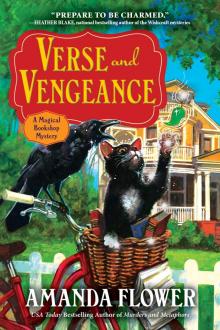 Verse and Vengeance
Verse and Vengeance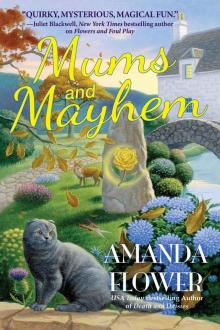 Mums and Mayhem
Mums and Mayhem Toxic Toffee
Toxic Toffee Criminally Cocoa
Criminally Cocoa Assaulted Caramel
Assaulted Caramel Maid of Murder aihm-1
Maid of Murder aihm-1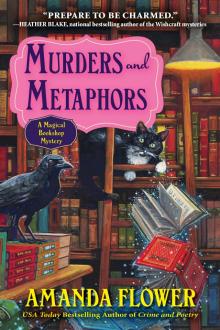 Murders and Metaphors
Murders and Metaphors Matchmaking Can Be Murder
Matchmaking Can Be Murder Maid of Murder (An India Hayes Mystery)
Maid of Murder (An India Hayes Mystery)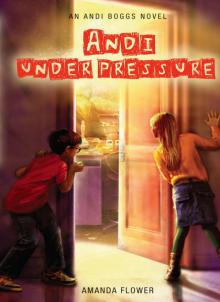 Andi Under Pressure
Andi Under Pressure Appleseed Creek Trilogy, Books 1-3
Appleseed Creek Trilogy, Books 1-3 A Plain Disappearance
A Plain Disappearance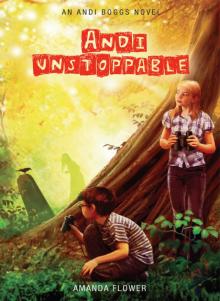 Andi Unstoppable
Andi Unstoppable The Final Vow
The Final Vow A Plain Malice: An Appleseed Creek Mystery (Appleseed Creek Mystery Series Book 4)
A Plain Malice: An Appleseed Creek Mystery (Appleseed Creek Mystery Series Book 4)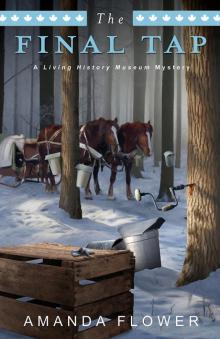 The Final Tap
The Final Tap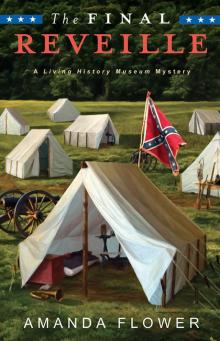 The Final Reveille: A Living History Museum Mystery
The Final Reveille: A Living History Museum Mystery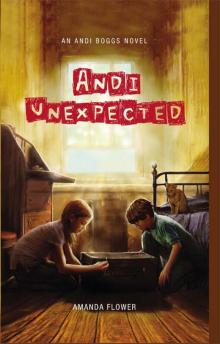 Andi Unexpected
Andi Unexpected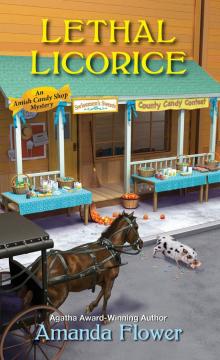 Lethal Licorice
Lethal Licorice Premeditated Peppermint
Premeditated Peppermint Death and Daisies
Death and Daisies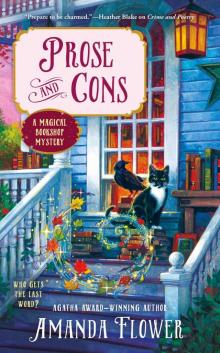 Prose and Cons
Prose and Cons